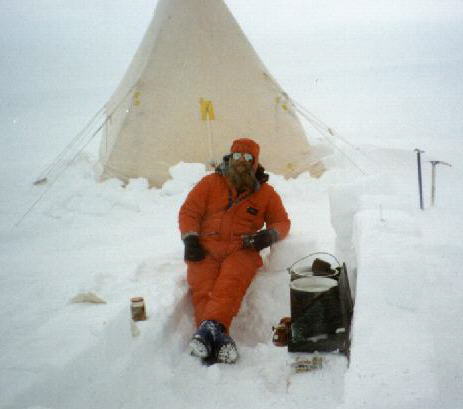From South School in New Zealand


Hi.
My name is Ben Witheford and I am a teacher at South School. My class is studying Antarctica and in particular living and working in Antarctica. I found your E Mail address on the internet last week and was wondering if you would be willing to reply to some E Mail messages from the children. Any assistance would be very much appreciated.
Thank you
Ben
Invercargill South School sthsch@es.co.nz
My name is Hayley Nelson. I am a standard 4 and I am ten years old. I am writing to you ask you a few questions. What is it like to live in Antarctica? How long do you work before you have a break? What is the hottest temperature you have had? Thank you for taking your time to answer these questions.
Yours sincerely,
Hayley
 Hi Hayley,
Hi Hayley,
I am not familiar with the schools in New Zealand, and do not know what a "standard 4" happens to be. Please let me know a little about you school. It is very different working here in Antarctica. I am living in McMurdo, which is on Ross Island, New Zealand dependency. Scott Base, part of NZAP is 2 miles down the road. They have 10 people working there this winter, 9 Kiwis and an Aussie. We have 233 people working in McMurdo. Most are US folks, with a few Kiwis here also.
We have not seen the sun in months. We are getting a few hours of gray light near noon every day. It is enough to see the mountains in the distance. We will get our first sunrise in 3 weeks.
I try to get a day off every week, but sometimes I go a few weeks without a day off. In the winter, there are no plane flights from February to November. This means there is no mail or fresh food. I arrived here in January, and will not leave until November.
The warmest weather I saw last summer was about 40F. As I am not used to working in centigrade temperatures, possibly you can convert the temperature. Lately, the temperature has been -20F to -30F, with lots of wind. The wind can easily drive the wind-chill to -75F. We have had a few times of -100F wind-chill.
Thanks for writing,
Dave
Yours sincerely,
Rauna
Hi Rauna,
Lately it has been windy and cold, but that appears to be the norm. The temperatures have been averaging -20F to -30F. The wind-chill has been commonly getting down to -70F, and sometimes as low as -100F. I have to dress very well to prevent frostbite.
We are getting a little light near noon every day. The next sunrise will be in three weeks. It was light when I arrived here in January. I flew from Christchurch on a plane with skis, and landed on the Ross Ice Shelf. There are no planes in or out from February until August. The next flight is in about three weeks. People here are getting ready for the planes by building runways and getting buildings and equipment ready.
I always thought of blizzards as being heavy snow storms. We do not get a lot of snow here. Technically this area is a desert because it is so dry. We do get snow, but it is very fine and dry. Sometimes the wind starts blowing the snow around causing whiteouts. This is when visibility is very low due to the blowing snow. I have seen these conditions a few times, and it is very strange to have white everywhere. When the sun is up, I wear sunglasses to protect my eyes from the reflections from the snow. The light is so bright, it can cause snow blindness.
Thanks for writing,
Dave
My name is Victoria Curry. I am ten years old and a standard 3. My school is studying Antarctica. Would you please answer some questions? What is dangerous about skiing in the summer time? How long are you staying in Antarctica for? Could you tell me about the first person to go to Antarctica? Thank you for your time and help.
Yours sincerely,
Victoria Curry
Hi Victoria,
Skiing or any travel can be dangerous any time of year. The glaciers are all around us, and are moving very slowly. As the ice moves, it can create crevasses which are difficult to see. People have died by falling into the crevasses. There are people here trained in looking for crevasses, and they mark routes for travel. Whenever anyone ventures out, they must stay on the marked routes.
I arrived here in McMurdo in January, and will be here until November. In October, there will be a few people coming in from our group, which will take over the operations. We will spend a few weeks with them, until they are familiar with the system. I work here tracking satellites gathering scientific data.
I am not sure if anyone can say with any certainty, who the first person to come to Antarctica. I imagine it was some early whalers or fisherman. The first famous explorer is Robert Scott. He built a hut about one half mile from here that served many early exploration groups. The hut still stand today in very good condition. I am sure you could find more information on the early explorers in your library. Have you ever seen the Scott statue in Christchurch?
Thanks for writing,
Dave
David Hess NK3T